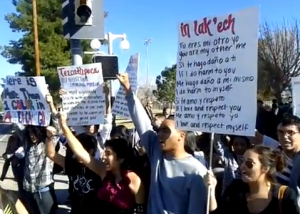Tucson’s Mexican American Studies Program Is Revived
 By Griselda Nevárez, Voxxi
By Griselda Nevárez, Voxxi
“I remember that exact day,” the 20-year-old told VOXXI. “I stayed after school just to see what the word was, and when I saw two girls crying in the hallway, I knew it had gone through.”
After several attempts by state Republicans to dismantle the Tucson Unified School District’s Mexican American Studies program, HB 2281 passed and became a law in January 2011. Supporters of the law, including former State Superintendent Tom Horne, said and taught students to have resentment toward a race or class of people.
Chavez had something else to say about the Mexican American Studies program. Before joining it, he said, he often got suspended from school and was put in detention. “I didn’t care about school in general. It wasn’t relevant to me,” he said.
But when he began taking classes offered by the program during his junior year, his grades began to improve. He started getting involved in school activities and interacting with teachers. Chavez said the education he got in the program was “nothing like I’ve ever experienced.”
“It provided the space for you to come up with your own ideas,” he said. “I started learning things, and I started realizing I could make positive change.”
Now, after the controversial Mexican American Studies department was terminated for being in violation of state law, the Tucson Unified School District is reviving it and giving it a new look.
It’s name will change to Mexican American Student Services and it will no longer teach courses about the contributions Mexican Americans make to society. Instead, the new department will focus on formulating strategies to assist struggling Latino students and address their education achievement gap, especially in math and reading.
This will be done under the new leadership of Maria Figueroa, who became the director of Mexican American Student Services this month.
TUSD removes ethnic studies book from classes, but they’re not banned. “Rethinking Columbus: The Next 500 Years”
Figueroa is not a newcomer to the department. In the late 1990s, she served on its advisory committee for curriculum and played a major role in promoting the use of Chicano literature in the classrooms. Back then, the department was called the Hispanic Studies Department.
When asked by the Arizona Daily Star whether she believes the Mexican American Studies courses were in violation of state law, she didn’t indicate whether she thinks they were or were not. Instead, she said, “I do stand firm in knowing and understanding that children need to read literature that is relevant to them and know the contributions they’ve made to society. I think that’s where our teachers were coming from.”
She also told the Tucson newspaper that the director position appealed to her because she saw that “a second tier of intervention” was needed. The first tier of intervention, she said, is what students learn from teachers in the classrooms. The second tier includes “intervention strategies such as mentoring and tutoring for our struggling students who need more,” she said.
The remodeling of the department comes a month after the fifth underground library, which holds more than 400 books that were banned from the Tucson Unified School District, opened in Phoenix on June 24. There are four other such libraries in Tucson, Houston, San Antonio and Albuquerque.
Motivated by the passage of HB 2281, members of a non-profit organization that promotes Latino literature and literacy began a five-day caravan across the southwest to collect thousands of banned books that were later donated to the five libraries. From March 12-17, members of “Nuestra Palabra: Latino Writers Having Their Say” traveled through six cities and called themselves “Librotraficantes.”
“When we saw on YouTube young people lamenting that administrators were forced to walk into classrooms during class time and, in front of our young, box up these books by our most beloved authors, we said that has gone too far and we had to do something,” Tony Castro, the leader of the caravan, told VOXXI.
Sandra Castro, a member of Puente Arizona, the organization hosting the fifth library in Phoenix, told VOXXI the books “awaken you” and give people “a sense of empowerment.”
“A lot of people who are in the activist community all share that in common,” she said. “We’ve read these books and we know our history. Our knowledge of our real history is why we organize.”
This article was first published in Voxxi.
Griselda Nevárez is a reporter with Hispanic Link News Service in Washington D.C.
[Photo by ThreeSonorans]
